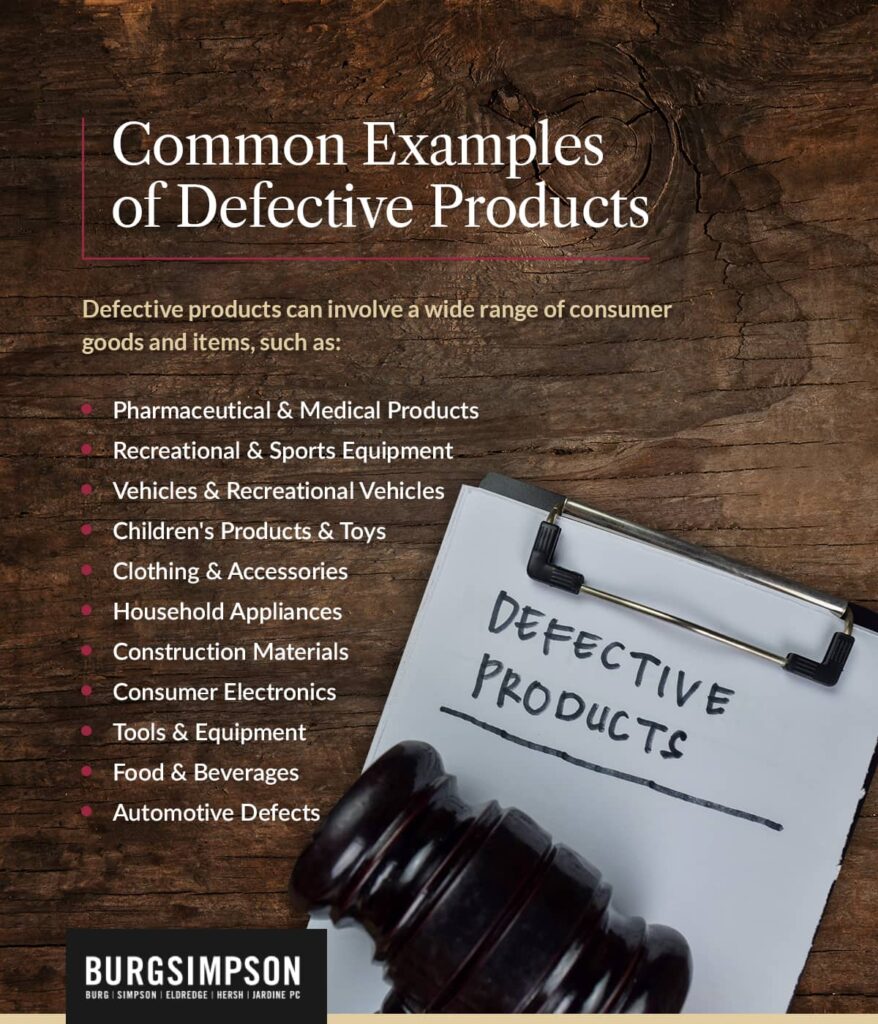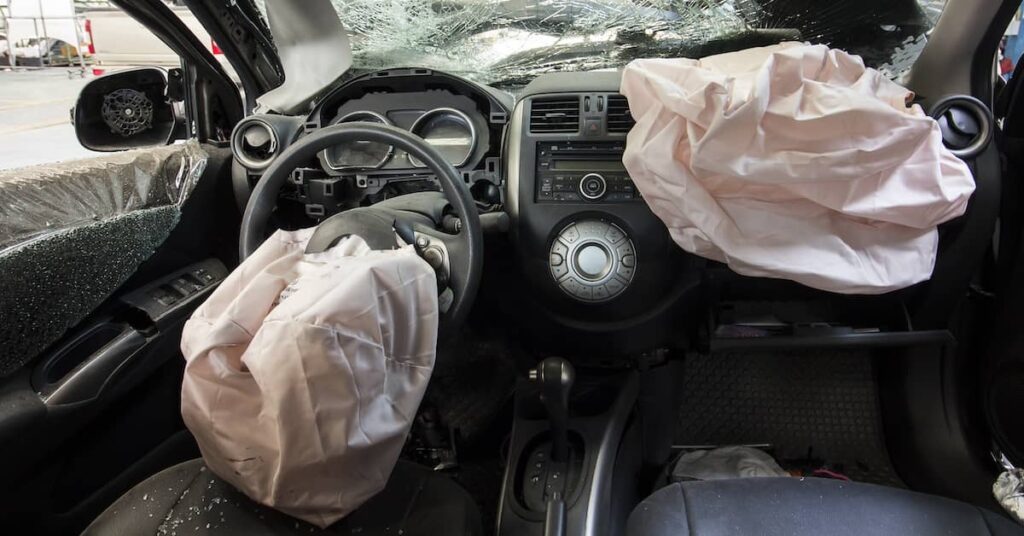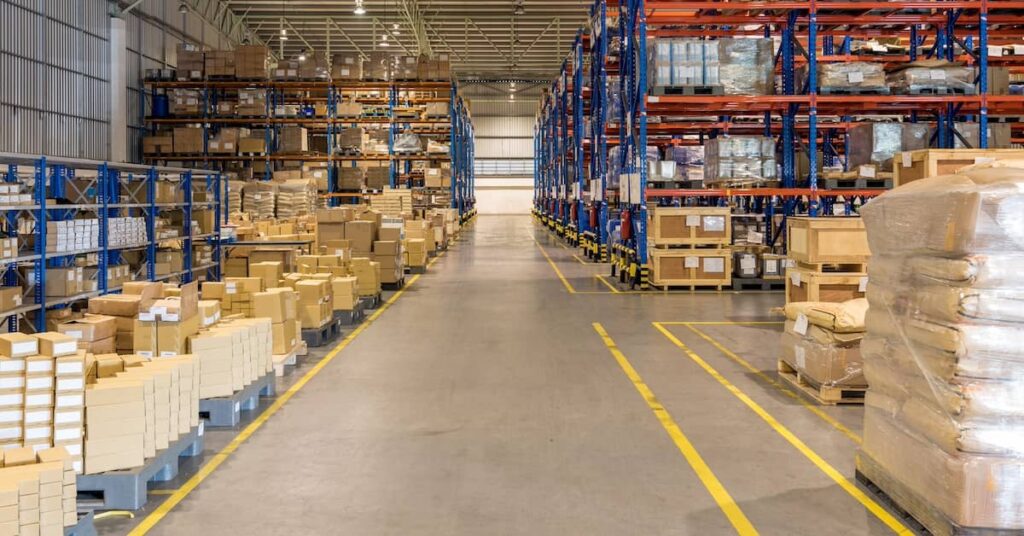Defective Product Attorneys Serving Denver and All of Colorado
The Denver product liability lawyers at Burg Simpson Law Firm have successfully represented the wrongfully injured in Colorado for years. We are committed to helping our clients recover the maximum compensation they deserve after an injury caused by defective products.
Founded in 1976, Burg Simpson has provided exemplary legal services for more than 45 years. Our decades of proven success encompass a wide range of situations, including injuries sustained by dangerous and defective products.
We are Good Lawyers. Changing Lives®. This is demonstrated by both the $2 billion we have recovered on behalf of our clients and the indelible impact we have made on the lives of those we proudly serve.
If you were injured by a dangerous or defective product, contact Burg Simpson today online or at 303-792-5595 for a FREE and confidential case evaluation with an experienced product liability attorney. We proudly serve clients throughout Colorado from our offices in Metro Denver.

What Are Common Examples of Defective Products?
Defective products can encompass a wide range of consumer goods and items. Here are some common examples of defective products that have been the basis for product liability claims:
Automotive Defects
Automotive defects include an array of issues that can compromise the safety and functionality of vehicles. Faulty airbags may deploy unexpectedly or fail to deploy during a crash, potentially increasing the risk of injury to occupants. Defective brakes or steering systems can impair a driver’s ability to control the vehicle properly. Acceleration issues causing unintended acceleration can pose serious dangers on the road, leading to accidents and potential harm. Tire blowouts due to manufacturing defects have been identified as sources of numerous accidents.
Pharmaceutical and Medical Products
Many cases have arisen concerning the safety and effectiveness of pharmaceutical and medical products. Prescription medications with undisclosed dangerous side effects can seriously harm patients who rely on them for treatment. Medical devices, such as hip implants or pacemakers, have faced scrutiny due to instances of faulty functionality that can pose risks to patients’ health and well-being.
Consumer Electronics
Consumer electronics pose a number of potential hazards. Exploding batteries in smartphones, laptops, and other electronic devices can result in serious injuries and property damage. Defective power cords or chargers add to the risks, as they may pose fire hazards and electrical risks. Pressure cookers with improper locking mechanisms may cause scalding and impact injuries to users.
Children’s Products and Toys
The safety of children’s products and toys has been a focal point for manufacturers and regulators. Toys with small parts pose choking hazards. Cribs or playpens with structural defects that endanger a child’s safety. Baby products containing harmful chemicals or materials endanger the most vulnerable members of society.
Household Appliances
Household appliances play a central role in daily life, and their safety is paramount to users’ well-being. Malfunctioning kitchen appliances that cause fires or electrical hazards pose substantial risks to households. Defective water heaters or furnaces that lead to carbon monoxide leaks are particularly dangerous, as carbon monoxide exposure can cause death.
Clothing and Accessories
Clothing with flammable materials poses serious fire risks. Accessories, such as jewelry, sometimes contain toxic substances like lead.
Tools and Equipment
Tools and equipment are essential for various tasks, but their safety is paramount to prevent accidents and injuries. Power tools with defective safety mechanisms endanger users who rely on them for various projects. Similarly, machinery with faulty components can lead to injuries during operation.
Food and Beverages
The safety of food and beverages is vital to our health and well-being. Instances of contaminated or mislabeled food products have highlighted the potential risks associated with consuming these products. Products with foreign objects or contaminants pose not only health risks but also concerns about product quality and proper manufacturing processes.
Construction Materials
Construction materials play a pivotal role in ensuring the integrity of buildings and structures. Defective building materials compromise structural integrity and jeopardize the safety of occupants. Additionally, construction equipment with malfunctioning safety features can lead to accidents and injuries on construction sites.
Recreational and Sports Equipment
Recreational and sports equipment contribute to an active and healthy lifestyle, but their safety is paramount to prevent injuries. Instances of bicycles with faulty brakes or weak frames pose risks to riders’ safety. Similarly, sporting gear with inadequate protective features can compromise the safety of athletes and enthusiasts.
Vehicles and Recreational Vehicles
Motorcycles and recreational vehicles (RVs) with design flaws and defective components compromise the safety of riders. Addressing these issues through rigorous design, manufacturing, and testing processes is vital to ensuring the safety of individuals on the road and during their recreational pursuits.
These are just a few examples of defective products that have been involved in product liability claims. Defects can arise in virtually any type of product, and when these defects lead to harm, they can result in legal actions to hold manufacturers, distributors, or other responsible parties accountable for the injuries caused. If you believe you’ve been harmed by a defective product, it’s essential to contact the product liability lawyers at Burg Simpson right away to discuss your case and legal options.
What Types of Defects May Be Involved in a Product Liability Claim?
In a product liability claim, defects can take several forms, each of which may contribute to the basis for the claim. The types of defects that could be involved include:
Design Defects
These occur when a flaw exists in the initial design of the product, making it inherently unsafe or posing a risk to users even when manufactured correctly. Design defects affect all products of that design. For example, a car model with a design flaw that makes it prone to rollovers could lead to a product liability claim.
Manufacturing Defects
These defects arise during the manufacturing or production process, resulting in a product that doesn’t conform to its intended design. Manufacturing defects typically affect a specific batch or subset of products. An example could be a batch of medicine contaminated with incorrect ingredients due to a manufacturing error.
Marketing Defects (Failure to Warn or Inadequate Instructions)
This category includes products that are properly designed and manufactured but lack proper warnings or instructions regarding potential risks or safe usage. If a product poses non-obvious dangers and the manufacturer fails to adequately inform consumers, they may be held liable if injuries occur due to the lack of proper warnings.
Labeling Defects
These defects involve incorrect or insufficient labeling that leads to misuse or misunderstanding of the product’s nature, resulting in harm. For instance, if a medication’s label fails to list certain potential side effects, and those side effects cause harm, it could lead to a product liability claim.
Assembly or Installation Defects
Some products require proper assembly or installation for safe use. If a product is improperly assembled or installed, leading to injury, the entity responsible for the assembly or installation may be liable.
Inherent Flaws
These are flaws that arise from the nature of the product itself and aren’t necessarily design or manufacturing issues. For example, inherent flaws could include fragile materials used in a product that is intended for heavy-duty use, causing it to break easily and lead to injury.
Performance Defects
These defects involve products that fail to perform as expected or as advertised, leading to harm. For example, a safety equipment product that doesn’t function as claimed, resulting in injury to the user, could be the basis for a product liability claim.
The success of a product liability claim depends on factors such as the nature of the defect, the evidence available, the harm caused, and the legal theories pursued. If you believe you have a defective product claim, contact the Denver product liability lawyers at Burg Simpson as soon as possible to schedule a FREE, no-obligation consultation.
Who Is at Fault in a Product Liability Claim?
In the context of a product liability claim, determining responsibility for an unsafe or defective product revolves around several key factors. When a product leads to harm or injury, the following parties could potentially be held liable:
- Manufacturer: The primary entity responsible for designing, creating, and distributing the product. If a flaw in the design, manufacturing, or labeling of the product causes harm, the manufacturer may be held accountable.
- Parts Manufacturer: If a product is composed of various components and a particular part is found to be defective, the manufacturer of that specific part could be held liable.
- Assembling Manufacturer: In cases where a product is assembled from different parts or components, the entity responsible for assembling the final product could be liable if the assembly process contributes to defects.
- Packaging Company: If inadequate packaging leads to product contamination, deterioration, or other hazards that result in harm, the company responsible for packaging could be liable.
- Wholesaler: The intermediary between the manufacturer and retailer may also carry liability if their handling or storage of the product contributes to its defectiveness or danger.
- Retailer: The entity selling the product to consumers could be held accountable if they were aware of the product’s defect or danger and failed to take appropriate measures, such as issuing recalls or warnings.
The specific circumstances surrounding the defect, its origin, and the actions or negligence of each party will determine who is at fault in a given product liability claim. It’s important to note that multiple parties along the production and distribution chain can share liability, depending on their involvement in the defect’s creation or propagation.
The Denver product liability lawyers at Burg Simpson Law Firm can help you navigate the complexities of these difficult cases.

How Long Do You Have To File a Defective Product Claim in Colorado?
In Colorado, the statute of limitations for filing a defective product claim typically falls within a period of two years from the date of injury, death, or property damage (see Colo. Rev. Stat. § 13-80-106). This means that you have two years from the date when the injury or harm resulting from the defective product occurred to file a claim against the responsible party or parties. However, it’s crucial to note that statutes of limitations can be influenced by various factors, including the specific circumstances of the case, the type of claim being pursued, and any potential exceptions.
Generally speaking, it is in your best interest to contact a Denver product liability lawyer as soon as possible after suffering an injury from a dangerous or defective product. A defective product attorney understands the time frames and considerations involved in these cases. The sooner you contact Burg Simpson, the sooner we can begin working on your case.
How Much Is My Defective Product Case Worth?
The value of a defective product case can vary widely depending on several factors. Here are some factors that can influence the potential worth of a product liability case:
- Severity of Injuries: The extent and severity of your injuries, including both physical and emotional harm, will play a significant role in determining the value of your case. Serious injuries may result in higher compensation.
- Medical Expenses: The costs associated with medical treatment, including hospitalization, surgeries, medications, rehabilitation, and ongoing care, will be factored into the case value.
- Lost Wages and Future Earnings: If the injuries resulted in time away from work or a diminished earning capacity, these losses can be part of the compensation calculation.
- Pain and Suffering: Compensation may also include non-economic damages such as physical pain, emotional distress, and loss of enjoyment of life.
- Property Damage: If the defective product damaged your property, like a vehicle in the case of an automotive defect, these costs will be considered.
- Product Liability Type: The type of product liability claim (negligence, strict liability, breach of warranty) and the evidence supporting your claim can impact the potential compensation.
- Liable Parties: The number and financial capability of the parties found liable for the defect can influence the available compensation.
To determine the potential worth of your specific defective product case, it is in your best interest to contact the product liability lawyers at Burg Simpson. During your FREE and confidential case evaluation, we will assess the unique circumstances of your case, consider the factors mentioned above, and provide you with an estimate of the potential compensation you might be eligible to receive.

How Can a Product Liability Lawyer Help?
A product liability lawyer handles cases in which consumers have been harmed or injured due to defective or unsafe products. Hiring a product liability lawyer can provide you with several important advantages throughout the legal process:
- Legal Knowledge: Product liability laws are complex. A skilled lawyer has in-depth knowledge of these laws and can guide you through the legal intricacies of your case.
- Case Assessment: An attorney will assess the merits of your case and determine whether you have a valid claim. They can evaluate the evidence, identify liable parties, and advise you on the potential outcomes.
- Gathering Evidence: Lawyers have experience in collecting and preserving evidence necessary to build a strong case. This may involve obtaining product records, conducting investigations, and consulting expert witnesses.
- Determining Liability: Identifying the responsible parties can be complex, especially in cases involving multiple entities along the supply chain. A lawyer can help determine which manufacturers, distributors, retailers, or others may be liable.
- Legal Strategy: A product liability lawyer will develop a tailored legal strategy for your case, considering factors such as the type of defect, jurisdiction, and applicable legal theories.
- Negotiations: Lawyers can engage in negotiations with insurance companies, manufacturers, and other parties to seek a fair settlement that compensates you for your injuries and losses.
- Litigation: If a fair settlement cannot be reached, a lawyer can represent you in court. They will present your case, cross-examine witnesses, and argue on your behalf to seek a favorable verdict.
- Expert Witnesses: Product liability cases often require the expertise of technical or medical professionals to explain complex issues to a jury. A lawyer can connect you with these experts to strengthen your case.
- Managing Paperwork: Legal cases involve substantial paperwork, filings, and deadlines. A lawyer will handle these administrative tasks, ensuring compliance with all legal requirements.
- Maximizing Compensation: A lawyer will work to secure compensation for various damages, including medical expenses, lost wages, pain and suffering, and future medical costs.
- Peace of Mind: Dealing with a product liability case can be stressful. Having a lawyer by your side provides you with the confidence that your rights are being protected and that someone is advocating for your best interests.
If you’ve been harmed by a defective product, contact Burg Simpson right away. We can provide personalized guidance and representation to help you pursue the maximum compensation to which you may be entitled under the law.
Contact a Denver Product Liability Lawyer Today
Product liability cases often involve large corporations and their massive legal teams. We are not intimidated by big companies and we don’t back down from a fight. If you were harmed by a defective product, it is in your best interest to speak with a Denver product liability lawyer at Burg Simpson right away. You may be entitled to compensation for your physical, financial, and emotional losses.
Contact Burg Simpson today online or at 303-792-5595 for a FREE and confidential case evaluation. Conveniently located in Denver, we proudly serve clients from Aurora, Lakewood, Highlands Ranch, Northglenn, and nearby areas in Colorado.





